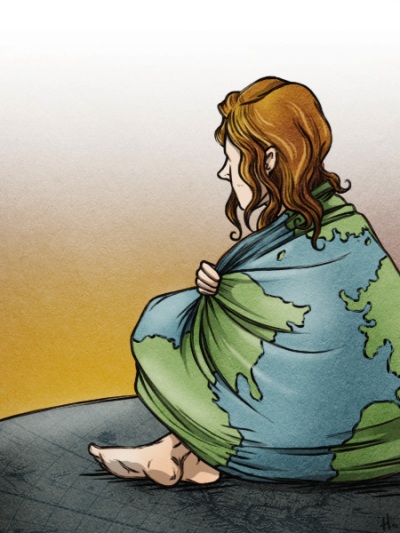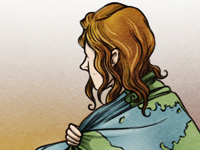In my fourth sublet in Berlin in the past eight months, I am growing accustomed to another person’s things around me, to her life quietly insinuating itself into my own. Her pictures, of nieces and nephews, of best friends and boyfriend, become mine, too, as I look at them every day with familiarity and a growing tenderness. Sometimes, I forget that it was not I who bought the plants and the curtains, but she. The lived-in feel of the place, the wear on the sofa and its fading floral print, convinces me that I have been here for years.
The longest I have lived anywhere is Atlanta, Georgia, in the American South. The five years of childhood I spent there were characterized by a sense of belonging that I didn’t know I would never grasp again. I looked like the other kids on my block, I spoke like them—my only odd trait was my Nancy Drew addiction and considerable height that forced me into the role of “giant” in neighborhood performances.
Perhaps even then I had a vague memory of difference from having attended a British kindergarten in London. As a baby, in Germany, my birthplace, did I sense that my parents were foreigners? Before speech, what exists to shut you out from another culture? I like the image of myself being wheeled in a stroller in Hamburg, just as inarticulate and bewildered as the German infants beside me, as our mothers paused at a red light.
 Zwischenmiete. Illustration for Denizen by David Habben
Zwischenmiete. Illustration for Denizen by David HabbenWe moved to Shanghai when I was twelve, and it was there, I believe, that I began to find the crease between cultures, its comfortable folds and soft, dark layers that I learned to use as blankets. More specifically: in the misunderstandings between others and myself, there was a relaxing, a breathing out, a sense of never being known that placated me. I existed as a representation of something: of whiteness, of American-ness, a cut out doll. At my international school, or with local Shanghainese people, you were constantly forced to offer “truths” about your homeland, facts about the people and their habits, which everyone accepted despite the artifice of the setup, the preposterous nature of cultural diplomacy, as if my faded memories enabled me to explain a nation.
As a foreigner, I began to live half there (back in Atlanta) and half here (in China), sinking into bubbling whirlpools of nostalgia with other “third culture kids” when discussing memories of home. None of us pictured the same place, the shared talk offered the feeling of camaraderie as one by one we drifted thousands of miles away from each other to Campinas, Brazil; Seoul, Korea; and my grandmother’s house in the North Georgia Mountains. Home became where you had left, where you were never going to live again.
The new country became the sublet, often quite literally. In Shanghai we lived in a furnished apartment suffused with anonymous gray hues: gray carpet, gray couch, mauve bed covers. In Singapore, where we moved next, the furniture was ours but the various houses we lived in were always rented, the pool held the memory of other children diving in, and waited patiently for us to leave, for other children to come.
I grew accustomed to my stark racial, linguistic, and cultural differences from those surrounding me. I began to base my sense of belonging, my self pride, with how well I could snuggle into that crease—how much of my American-ness I could lose, how much of the Chinese culture I could gain… for there was never any danger that I would ever go entirely one way or the other. I would never be accepted as a Chinese person, and, after we left Atlanta, I would never accept myself again as an American.
Walter Benjamin, in The Task of the Translator, describes the notion of “pure language,” where, in the attempt of translation, the translator briefly accesses the exalted ground of a transcendent tongue that encompasses all languages. In the effort to translate, one speaks profoundly. Once the translation has been made, you come crashing back to earth, having performed the inevitable failure.
Pure language—die Zwischenmiete—renting a liminal space that you will soon leave, but which you inhabit with the desperate delusions of an exile. Neither here nor there—open, sympathetic, offering everything in yourself to the culture you have plunged into, knowing you will always be safe and relatively unknown in the deep fjord between your homes. I feel myself sailing across the gap, speaking excitedly with a new acquaintance about similarities between our cultures, finding the connections. Maybe I am speaking in English. Maybe it is halting Chinese, German, Khmer, or a laid-on Southern accent if I’m visiting relatives in Mississippi. Yet I am also looking up from the bottom of the trench, watching myself make the leap, watching myself re-fall.
I feel most afraid of being in America, or being among other Americans. I feel flattened, two-dimensional. In the presumption that there is no gap, I am lost in an open field. I don’t know what to say. I quickly try to establish myself as having grown up overseas, as Other. I try to paint over my whiteness with the Asian places I have lived. “Oh, I know Atlanta well,” another American says to me, at a party in Berlin, when I tell her that’s where I’m from. “Well, I’m not really from there,” I hurry to say. “It’s just what I say.”
Just what I say. I expose the mask to put on another, thicker one. The task of masking, its inconveniences—barely seeing through the eyeholes, the difficulty of breathing through the plaster—feels important, noble, modern and sexy. There is something martyr-like about the discomfort, the homelessness I insist upon. In it I am always fumbling, searching for the right word, the right explanation. The joy, when it comes, is of finally being understood, despite language, despite culture, despite foreign-ness, mask ripped off. The opposite rapture, which is always there, in the depths of the trench, the mask my own skin, by now, is the thrill of being unknown, never settling down, dreaming about your old homes in other people’s beds.

I’ve never read an article that so perfectly summed up the way I feel about the life I have led and the life I plan to lead.
LikeLike
Beautiful piece, Brittani. Sobering yet uplifting… comforting yet makes me homesick. I love it.
LikeLike
Great piece!
LikeLike
This is amazingly well written. Thank you for putting the feelings most third culture kids experience into words.
LikeLike
I’d never heard of Zwischenmiete before, but now that I know I know what my next reading will be. Brittani, I have to say this piece can’t help but speak to every TCK on the face of the planet. Some of us haven’t moved as much as others, but the feelings remain.
As far as the description of Zwischenmiete goes in your article though, I almost feel I know what it is – I was raised trilingual for the first 6 years of my life, and today I’m still native in 2 languages. It’s not rare for me to find myself thinking of concepts without any words, just ideas. Only to destroy the concept when attempting to explain it. I can relate only too well to that feeling of failure at the end of it.
Anyways, I’ll say this though: as much as TCKs move forward in life leaving things behind, there are always things that come with us, forever: memories and friends. Ok, friends may not move with you, but friendships remain, no matter how many time differences you have to face. Embrace those as a solid “home ground” to move forward, they’ll never let you down 🙂
LikeLike
Thank you Brittani for writing such a great article which eloquently describes how I feel, and which no doubt many others like me feel too.
It’s a permanent battle between trying to belong, and revelling in the fact that we don’t really “belong” anywhere. Or the “crease between cultures” as you say. I haven’t lived in half as many places as you, but there are enough creases for me to understand what you mean. It’s a comforting place to be. Betwixt and between. Maybe that’s why I feel most at home at airports…
“Home became where you had left, where you were never going to live again.” What a great phrase! I’ve quoted you on my FB page – hope you don’t mind.
Thank you once again. I’ll think of your article when I dream of old homes in other people’s beds, and when I dream of other people’s beds in new homes.
LikeLike
I am a tck and this was a well written article. Only one issue “Home became where you had left, where you were never going to live again.”
Home was always New Guinea (Indonesia) and I returned 11 years ago – and am still here and will be a citizen by next year. Sometimes, but rarely, you can go home.
LikeLike
Eloquently written. I love that you mentioned being “neither here nor there”. Your article makes me want to dance (my way of expressing all those uneasy feelings).
I’m going to quote your article on FB, Twitter, and my blog.
LikeLike
You have found the words I could never find.
LikeLike
wow, this piece and especially that last paragraph is genious! thanks for this!
LikeLike
Pingback: projecthires |
Hi! I am writing an article for a small foreign relations mag in Norway. We were wondering if we could use this Picture, of course with Credits, for an article about mental health and the expat existence. Please send me an email.
Mag:Www.bistandsaktuelt.no
LikeLike
Hi Marta, you’ll need to reach out to David Habben (https://davidhabben.com/) for permission to use his illustration. Thank you.
LikeLike